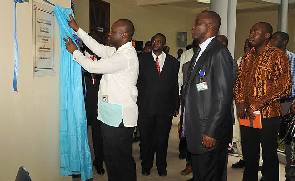 A business incubation centre designed to create the necessary linkage between the Kumasi-based Kwame Nkrumah University of Science and Technology and industry has been commissioned.
A business incubation centre designed to create the necessary linkage between the Kumasi-based Kwame Nkrumah University of Science and Technology and industry has been commissioned.
The centre is expected to serve as grounds for the promotion and nurturing of innovative business ideas in Ghana’s second largest city, Kumasi.
Communications Minister, Dr. Edward Omane-Boamah signed the contract on behalf of the Ministry of Communications with the consortium of KNUST and NBSSI on January 9, 2014 for the construction of the facility.
Speaking at the commissioning ceremony, he “commend[ed] KNUST for providing these physical facilities in which the incubator is located. It is a sign of your commitment to the success of the incubator. I am also very excited to see the extent of work done in terms of improving the infrastructure and human resource capacity in innovation and entrepreneurship within this short period of time.”
The minister said that, “In many developed and developing countries, business incubators have been used to foster innovation and entrepreneurship and create business opportunities and jobs in local environments.”
Business incubation, he stressed, “generates important ‘externalities’ by creating a platform for leaders to influence the broader business environment for high-growth small and medium-size enterprises (SMEs). Based on the important role business incubators play, particularly in more challenging business environments, several emerging markets such as Brazil, India and South Africa have implemented policy frameworks, which include direct and indirect support for business incubation.”
He revealed that “A business incubation policy framework has been developed for Ghana under the eGhana Project with funding from the World Bank.”
The system is designed to focus on providing output-based subsidies to business incubators or similar public or private institutions that facilitate local innovation and entrepreneurship by incubating and developing new businesses in the ITES sector.
According to him, the long term policy objectives of incubation includes enhancing the survival and growth of early stage businesses with the potential for significant growth through the establishment of high quality, financially self-sustaining incubators.
It also aims “To increase the number of operating incubators to a number appropriate to the business population and stage of development of the country, and to its aspiration to become a Middle-Income Country by 2015.”
Realizing the importance of ICT in the growth of the country, the business incubation project also hopes to generate an annually-increasing number of high-potential business starts particularly in technology-related sectors.
Dr. Omane-Boamah said the project amongst others, will seek “To promote best practice in management and service delivery among incubators in Ghana; To enhance networking amongst incubators and organisations with an interest in incubation; To include in the networks universities and research centres, thereby encouraging technology transfer and commercialisation; and To fill gaps in incubator formation and growth by supporting the development of new incubators, including through public-private partnerships.”





